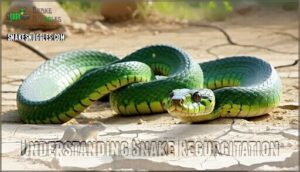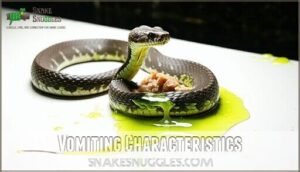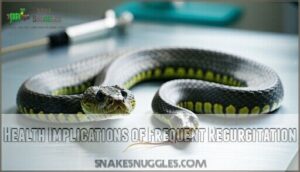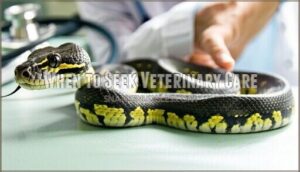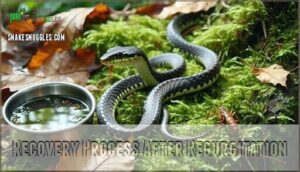This site is supported by our readers. We may earn a commission, at no cost to you, if you purchase through links.

Think of it as your pet’s "emergency eject button" – when danger seems near, they’ll quickly expel their meal to escape faster.
Unlike vomiting, regurgitation involves no stomach contractions, so the food comes up relatively intact through the esophagus.
Common triggers include handling too soon after feeding, sudden temperature changes, loud noises, or illness.
It’s like your snake saying, "Better safe than sorry!"
While occasional episodes aren’t always serious, frequent regurgitation can signal deeper husbandry issues or health problems that need your attention and proper prevention strategies.
Table Of Contents
- Key Takeaways
- Why Do Snakes Regurgitate?
- Understanding Snake Regurgitation
- Differences Between Regurgitation and Vomiting in Snakes
- Common Causes of Snake Regurgitation
- Signs Your Snake May Regurgitate
- Immediate Actions After Snake Regurgitation
- Prevention Strategies for Snake Regurgitation
- Health Implications of Frequent Regurgitation
- When to Seek Veterinary Care
- Recovery Process After Regurgitation
- Frequently Asked Questions (FAQs)
- Is it bad for a snake to regurgitate?
- Why does my snake keep regurgitating?
- How long to wait after snake regurgitates?
- Why do snakes vomit after eating?
- What is the difference between vomiting and regurgitation in snakes?
- Why do snakes regurgitate their meals?
- Why is my snake regurgitating water?
- Why do snakes regurgitate?
- Do snakes regurgitate their last meal?
- What should I do if my snake regurgitates food?
- Conclusion
Key Takeaways
- Your snake regurgitates as a survival reflex when stressed or threatened – it’s their "emergency eject button" that helps them escape faster by dumping their meal to redirect energy from digestion to movement.
- You can prevent most regurgitation by maintaining proper temperatures (88-92°F basking, 78-80°F cool side), avoiding handling for 48 hours after feeding, and choosing prey no larger than your snake’s thickest body part.
- You’ll know regurgitation is happening when you see restlessness and mouth gaping, body contractions, and bubbly fluid around the mouth – the expelled food comes out whole and undigested, unlike vomiting which produces partially digested, smelly material.
- If your snake regurgitates, you must wait 14 days before offering food again, clean the enclosure thoroughly, and monitor closely – frequent regurgitation robs essential nutrients and digestive acids, requiring veterinary care if it continues.
Why Do Snakes Regurgitate?
Your snake’s regurgitation serves as a built-in escape mechanism – it’s nature’s way of helping them survive threats.
When stressed or uncomfortable, snakes instinctively expel food to redirect energy from digestion to quick movement.
When danger strikes, snakes dump their dinner and dash – survival trumps a full stomach every time.
This wild regurgitation behavior, while concerning in captivity, stems from their survival instincts responding to digestive discomfort or environmental stress impact.
Understanding Snake Regurgitation
Before diving into the causes, let’s nail down what snake regurgitation actually means. This physiological response happens when your snake expels undigested food from its esophagus or stomach, typically within 12 hours of eating.
Think of it as your snake’s "emergency eject button" – an escape mechanism that redirects energy from digestion to survival. Wild regurgitation serves a purpose: when threatened, snakes dump their meal to flee faster.
Your pet snake’s brain doesn’t distinguish between a wild predator and snake stress from poor conditions. Husbandry problems like incorrect temperatures, excessive handling, or habitat changes trigger this ancient survival instinct.
Here’s the key point: regurgitated food comes out almost intact, and your snake receives zero nutrients from it. This process robs them of essential digestive acids, making snake health management vital.
One common cause is stress from handling, especially soon after feeding. Understanding this regurgitation definition helps you prevent unnecessary stress and keep your snake thriving.
Differences Between Regurgitation and Vomiting in Snakes
When you’re dealing with a snake that’s expelled its meal, you’ll need to determine whether it’s regurgitation or vomiting, since these two processes are as different as a gentle sneeze and a full-blown cough.
Regurgitation happens within hours of feeding and brings up whole, recognizable food, while vomiting occurs later and produces a smelly, partially digested mess that signals potential health problems, indicating a possible issue with the snake’s health.
Regurgitation Characteristics
Regurgitation in snakes involves passive expulsion of undigested food from the esophagus.
This behavioral response typically occurs within 12 hours of feeding, making the timeframe relatively predictable.
You’ll recognize regurgitated material because it maintains its original food condition – the prey looks almost identical to when swallowed.
Unlike vomiting, snake regurgitation happens without force, often triggered by snake stress that disrupts normal snake digestion.
Identifying whether it’s regurgitation or vomiting is important, as <strong>underlying illnesses</strong> are often the cause of the latter.
Vomiting Characteristics
Unlike regurgitation, vomiting represents a more advanced digestion stage where your snake forcefully expels partially processed material.
This active expulsion creates distinct health indicators that demand immediate attention.
Vomit composition differs dramatically from regurgitated food:
- Partially digested matter – resembles chunky, acidic soup rather than whole prey
- Bile presence – yellow or green fluid indicates stomach involvement
- Foul odor – strong, unpleasant smell accompanies the expelled material
These vomiting characteristics signal serious underlying conditions requiring veterinary urgency.
Common Causes of Snake Regurgitation
Understanding why your snake regurgitates can save you from the panic of finding undigested prey in the enclosure, and it’s usually something you can fix with better care practices.
Most regurgitation happens because of stress, improper temperatures, or handling mistakes, but knowing the specific triggers helps you create a safer environment for your scaly friend.
Environmental Factors
Several environmental factors can trigger snake regurgitation, making your pet’s habitat essential for digestive health.
Temperature gradients that are too low prevent proper digestion, while sudden fluctuations stress your snake’s system. Poor humidity levels and inadequate enclosure size create additional stress.
Without proper hiding spots, snakes feel exposed and anxious. Inappropriate lighting needs disrupt natural rhythms.
A dirty snake environment breeds bacteria and parasites. Managing these environmental factors prevents stress and keeps your snake healthy.
Newborn boas are particularly susceptible to regurgitation after feeding.
Handling Issues
Beyond temperature concerns, improper snake handling creates significant stress that triggers snake regurgitation. Post-Feed Handling within 48 hours forces your snake’s natural escape response, causing them to expel their meal.
Handling Frequency matters too – constantly disturbing your snake overwhelms their system.
Here’s how handling issues cause problems:
- Excessive Handling Duration disrupts digestion cycles
- Moving snakes during vulnerable feeding periods increases stress
- Rough handling activates flee reflexes
Practice Safe Handling and Stress Reduction techniques.
Feeding Problems
Three feeding mistakes cause most snake regurgitation cases. Prey Size matters—anything larger than your snake’s thickest body part spells trouble.
Poor Thawing Methods and irregular Feeding Schedule create digestive chaos. Food Quality directly impacts health, especially when housing Multiple Snakes.
| Feeding Problem | Prevention Strategy |
|---|---|
| Oversized prey | Match prey to snake’s girth |
| Frozen food bacteria | Thaw in refrigerator only |
| Irregular timing | Maintain consistent schedule |
| Poor food storage | Use fresh, quality feeders |
Health Concerns
Sometimes your snake’s regurgitation signals deeper health issues lurking beneath the surface.
Parasitic infections like cryptosporidium damage the digestive tract, while bacterial infections, fungal infections, and viral infections disrupt normal gut function.
Organ obstructions from ingested bedding can block digestion entirely.
These snake health issues create stress and trigger regurgitation as your pet’s body struggles to cope.
Veterinary care becomes critical when snake illness is suspected.
Signs Your Snake May Regurgitate
Knowing the common causes of snake regurgitation helps, but spotting the warning signs early can save your snake from unnecessary stress. Restlessness signs appear first—your snake might pace, coil tightly, or stretch repeatedly like it’s trying to find a comfortable position.
Mouth gaping becomes more frequent, and you’ll notice unusual swallowing motions. Think of it as your snake’s way of saying "something’s not right." Body contractions create visible bulges that move along the snake’s length, almost like waves under the skin.
Dehydration symptoms include sunken eyes and wrinkled skin, which weaken your snake’s overall health. The telltale sign? Bubbly fluid around the mouth—clear, frothy liquid that signals imminent regurgitation.
These snake regurgitation signs don’t lie:
- Defensive behavior or food refusal
- Increased mouth movements and gaping
- Visible contractions along the body
- Clear, bubbly secretions near the mouth
Recognizing these snake stress indicators helps you act quickly.
Immediate Actions After Snake Regurgitation
When you discover your snake has regurgitated, don’t panic—think of it as your pet’s way of hitting the reset button on dinner.
You’ll need to act quickly but calmly, cleaning the mess thoroughly and giving your snake the care it needs to recover from this stressful experience, which can be seen as your pet’s way of hitting the reset button.
Cleaning The Enclosure
After snake regurgitation, you’ll need to tackle cleaning the enclosure immediately.
Remove any expelled food and disinfect all surfaces to prevent bacterial growth that could worsen environmental issues.
Replace soiled substrate completely—it’s not worth risking your snake’s health over a few dollars.
Using a safe enclosure cleaner is essential for disinfection.
Daily water changes and proper husbandry practices help create the clean environment your recovering snake needs.
This is crucial for maintaining a healthy environment, and following these steps ensures your snake recovers well, which is the ultimate goal of recovering snake care.
Caring for The Snake
After cleaning your snake’s home, focus on your pet’s wellbeing.
Avoid handling for 48 hours to prevent additional stress. Monitor your snake’s behavior closely—watch for lethargy or unusual movements.
Keep the environment warm and quiet for ideal recovery. Replace water daily to maintain proper hydration methods.
Administering probiotics aids gut health during recovery. If snake regurgitation continues, contact your veterinarian immediately for professional snake care guidance.
Prevention Strategies for Snake Regurgitation
You can prevent most regurgitation episodes by maintaining proper temperatures, avoiding handling after meals, and creating a stress-free environment for your snake.
Think of it like giving your pet the perfect dinner party conditions, where they won’t feel rushed or uncomfortable while digesting their food, which can be considered a perfect dinner.
Proper Husbandry
Good snake husbandry creates the foundation for preventing regurgitation.
You’ll need proper temperature gradients with basking spots around 88-92°F and cool zones at 78-80°F. Providing an adequate snake basking spot is essential for thermoregulation.
Temperature regulation directly affects your snake’s digestion.
Provide secure hiding spots on both warm and cool sides to reduce stress.
Regular enclosure cleaning removes bacteria that could trigger health issues and regurgitation episodes.
Correct Feeding Practices
Feeding your snake properly is like following a recipe – get the ingredients wrong, and you’ll face digestive disasters.
Snake regurgitation often stems from poor snake feeding practices that disrupt snake digestion.
- Prey Size: Choose food no larger than your snake’s thickest body part
- Thawing Methods: Defrost frozen prey completely in cool water, never at room temperature
- Feeding Schedule: Maintain consistent intervals between meals to support proper snake diet and minimize snake regurgitation risks
Handling Guidelines
Think of handling like picking up a sleeping baby – timing matters. Wait at least three days after feeding before touching your snake.
Post-Feed Handling stress causes most regurgitation incidents. Limit Handling Frequency to twice weekly maximum.
Support their body evenly when lifting. Watch for Recognizing Stress Signs like defensive posturing or rapid breathing.
Minimizing Snake Stress through proper Safe Handling Duration prevents why snakes regurgitate. Remember, snake handling precautions aren’t just suggestions – they’re your snake’s lifeline against handling issues, emphasizing the importance of proper handling.
Health Implications of Frequent Regurgitation
Repeated snake regurgitation creates a domino effect of health implications that can seriously compromise your pet’s well-being.
Digestive Acid Loss occurs each time your snake regurgitates, robbing them of essential stomach acids needed for proper digestion. This leads to poor Nutrient Absorption, causing malnutrition even when feeding resumes.
The Stress Impact weakens your snake’s immune system, making them vulnerable to infections and diseases. Over time, frequent regurgitation can cause Esophageal Damage from repeated acid exposure and forceful contractions.
Snake health concerns escalate quickly when regurgitation becomes chronic, potentially leading to organ dysfunction and life-threatening complications that require immediate Veterinary Intervention to prevent permanent damage.
When to Seek Veterinary Care
While occasional regurgitation happens, repeated regurgitation signals serious trouble.
You’ll need veterinary care when your snake shows lethargy signs, weight loss, or refusal to eat after multiple episodes. Watch for abnormal behavior like excessive hiding, mouth breathing, or unusual posturing.
Snake regurgitation symptoms that warrant immediate attention include bloody material, foul odors, or regurgitation occurring more than 48 hours after feeding. These health concerns often indicate infections, parasites, or organ dysfunction that home care can’t fix.
Don’t play the waiting game with snake illness symptoms. A qualified reptile veterinarian can perform blood work, imaging, and fecal exams to identify underlying causes. Early intervention prevents minor issues from becoming life-threatening emergencies. A key indicator is labored or wheezing breathing, which may signal a respiratory infection.
Recovery Process After Regurgitation
After your snake regurgitates, you’ll need to follow a careful recovery plan that includes a 14-day fasting period, gradual food reintroduction, and close health monitoring.
Think of it like nursing a sick friend back to health—patience and the right steps make all the difference in helping your snake bounce back safely.
Fasting Period
Once you’ve consulted your vet, your snake needs a fasting period of 14 days minimum.
This digestive reset helps their system recover from snake regurgitation stress. Fasting benefits include restoring proper digestion and reducing re-feeding risks.
Keep providing fresh water—hydration importance can’t be overstated.
Environmental factors, such as temperature, can also play a role, so verify optimal conditions maintained.
Different species may need varying fasting duration, so follow your vet’s guidance.
Reintroducing Food
After your snake’s fasting period, gradual reintroduction becomes your next priority.
Start with smaller prey – about half your snake’s normal meal size.
This gentle approach supports proper digestion and snake recovery.
- Wait at least two weeks before offering food
- Choose prey 1/2 to 1/4 smaller than usual
- Monitor for any signs of digestive distress
Think baby steps, not feast mode.
Monitoring Health
Once your snake accepts food again, monitoring health becomes your top priority.
Watch for behavior changes like lethargy or unusual hiding patterns. Regular weight monitoring helps track recovery progress.
Schedule parasite checks with your vet, as stress weakens immunity against bacterial infections and fungal infections.
Think of snake health assessment as your early warning system—catching problems before they become serious keeps your scaly friend thriving.
Frequently Asked Questions (FAQs)
Is it bad for a snake to regurgitate?
Well, you’re definitely not winning any parenting awards when your pet snake loses its lunch.
Yes, regurgitation’s quite harmful—it’s stressful, robs essential nutrients, depletes digestive acids, and can become life-threatening if it happens repeatedly.
Why does my snake keep regurgitating?
Your snake’s repeated regurgitation likely stems from stress, improper temperatures, or handling too soon after feeding.
Check your enclosure’s heat, avoid post-meal handling, and make certain proper prey size to break this concerning cycle, likely caused by improper temperatures or other factors.
How long to wait after snake regurgitates?
Wait fourteen days before offering food again after your snake regurgitates.
This fasting period lets their digestive system recover from the stress.
Start with smaller prey than usual when you resume feeding.
Why do snakes vomit after eating?
Like a stomach turning inside-out, your snake’s digestive system rebels when stress, improper temperatures, or oversized prey overwhelm it.
You’ll notice this happens when they can’t properly process their meal due to environmental issues, such as stress or improper temperatures.
What is the difference between vomiting and regurgitation in snakes?
When you’re observing your snake, regurgitation brings up undigested, recognizable food shortly after eating, while vomiting expels partially digested, acidic material later. Regurgitation’s typically stress-related; vomiting indicates illness.
Why do snakes regurgitate their meals?
Your snake’s basically hitting the panic button.
Stress from handling too soon after eating triggers regurgitation – it’s their natural "drop everything and run" response to threats, redirecting energy from digestion to escape, which can be considered a threat.
Why is my snake regurgitating water?
Your snake’s likely drinking too much water at once, especially if it’s a rosy boa or similar species.
Excessive water intake can trigger regurgitation, so monitor drinking habits and provide smaller water dishes, as this can help prevent regurgitation.
Why do snakes regurgitate?
Ninety percent of regurgitation cases stem from environmental stress.
Your snake’s natural escape mechanism kicks in when it feels threatened, expelling undigested food to lighten its load for quicker movement and survival.
Do snakes regurgitate their last meal?
Yes, you’ll typically see snakes regurgitate their most recent meal, not older food. They expel undigested prey within 12 hours of eating, usually when stressed or threatened after feeding.
What should I do if my snake regurgitates food?
Don’t panic when your snake’s meal makes a U-turn.
First, wait 14 days before offering food again. Check your temperatures, reduce handling, and make certain proper husbandry.
If it happens repeatedly, contact a reptile veterinarian immediately.
Conclusion
Understanding why snakes regurgitate is like mastering your pet’s secret language – it’s all about recognizing their stress signals.
You’ve learned that proper temperature control, gentle handling, and correct feeding schedules prevent most regurgitation episodes.
Remember, your snake isn’t being dramatic when they expel their meal; they’re following ancient survival instincts.
By maintaining consistent husbandry practices and watching for warning signs, you’ll keep your scaly friend healthy and reduce regurgitation incidents substantially, which is key to a healthy and thriving pet, and this is all about proper temperature control.

